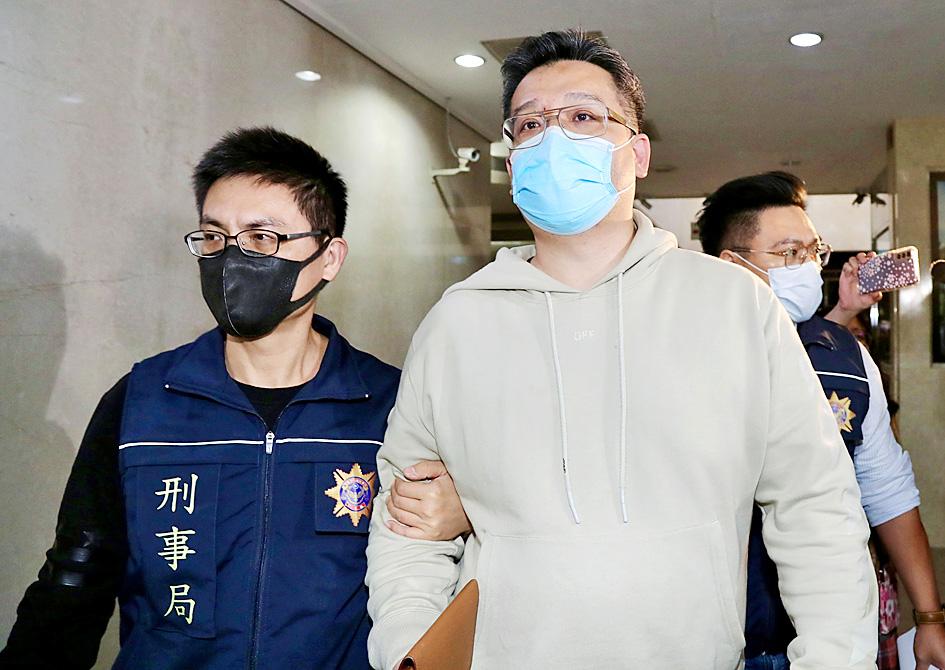Dianthus Medical Group (禾馨醫療集團) chief executive officer Lin Tzu-hung (林思宏) was released on NT$5 million (US$181,002) bail yesterday, after he was questioned by prosecutors over an alleged medical insurance fraud that involved collusion with patients over services costing NT$30 million.
The Taipei District Prosecutors’ Office and the Criminal Investigation Bureau on Thursday searched five Dianthus clinics in Taipei and other cities, detaining 25 people for questioning.
Five doctors at Dianthus clinics were yesterday released on bail ranging from NT$1 million to NT$3 million after questioning by Taipei prosecutors.

Photo: CNA
Taipei-based Dianthus operates clinics specializing in pediatrics, maternal-fetal medicine, dentistry and ophthalmology, and focuses on municipal Taipei and Taoyuan.
Lin and Dianthus doctors are suspected of forging diagnoses on behalf of pregnant women that made them eligible for insurance payouts after giving birth by caesarean section, the prosecutors said.
The forged diagnoses cited developing complications and other medical conditions, they said.
Clinic personnel allegedly colluded with about 300 women to receive payouts totaling NT$30 million, mainly from three insurance firms, they said.
Lin and the five doctors released on bail would face fraud and forgery charges, they said.
Dianthus said in a statement that it would fully cooperate with the investigation.
After his release, Lin wrote on social media: “We are hustling in a busy world and might easily be stabbed with a knife.”
“Now that I was interrogated, it is the best for me to wait,” he wrote. “I am mentally strong, and I can deal with it. Thanks for everyone’s concern and support.”

Beijing could eventually see a full amphibious invasion of Taiwan as the only "prudent" way to bring about unification, the US Department of Defense said in a newly released annual report to Congress. The Pentagon's "Annual Report to Congress: Military and Security Developments Involving the People's Republic of China 2025," was in many ways similar to last year’s report but reorganized the analysis of the options China has to take over Taiwan. Generally, according to the report, Chinese leaders view the People's Liberation Army's (PLA) capabilities for a Taiwan campaign as improving, but they remain uncertain about its readiness to successfully seize

HORROR STORIES: One victim recounted not realizing they had been stabbed and seeing people bleeding, while another recalled breaking down in tears after fleeing A man on Friday died after he tried to fight the knife-wielding suspect who went on a stabbing spree near two of Taipei’s busiest metro stations, Taipei Mayor Chiang Wan-an (蔣萬安) said. The 57-year-old man, identified by his family name, Yu (余), encountered the suspect at Exit M7 of Taipei Main Station and immediately tried to stop him, but was fatally wounded and later died, Chiang said, calling the incident “heartbreaking.” Yu’s family would receive at least NT$5 million (US$158,584) in compensation through the Taipei Rapid Transit Corp’s (TRTC) insurance coverage, he said after convening an emergency security response meeting yesterday morning. National

Taiwan has overtaken South Korea this year in per capita income for the first time in 23 years, IMF data showed. Per capita income is a nation’s GDP divided by the total population, used to compare average wealth levels across countries. Taiwan also beat Japan this year on per capita income, after surpassing it for the first time last year, US magazine Newsweek reported yesterday. Across Asia, Taiwan ranked fourth for per capita income at US$37,827 this year due to sustained economic growth, the report said. In the top three spots were Singapore, Macau and Hong Kong, it said. South

PLANNED: The suspect visited the crime scene before the killings, seeking information on how to access the roof, and had extensively researched a 2014 stabbing incident The suspect in a stabbing attack that killed three people and injured 11 in Taipei on Friday had planned the assault and set fires at other locations earlier in the day, law enforcement officials said yesterday. National Police Agency (NPA) Director-General Chang Jung-hsin (張榮興) said the suspect, a 27-year-old man named Chang Wen (張文), began the attacks at 3:40pm, first setting off smoke bombs on a road, damaging cars and motorbikes. Earlier, Chang Wen set fire to a rental room where he was staying on Gongyuan Road in Zhongzheng District (中正), Chang Jung-hsin said. The suspect later threw smoke grenades near two exits